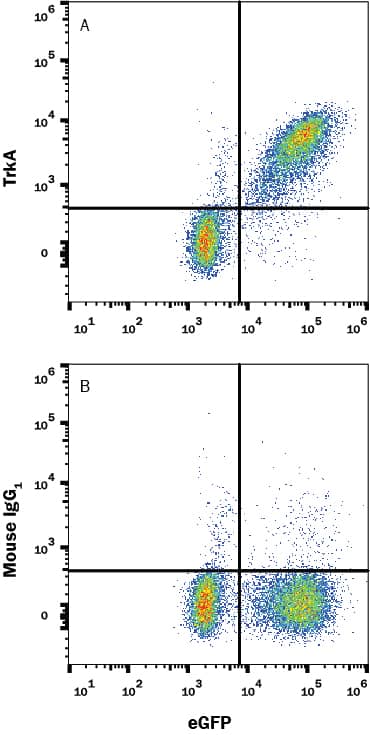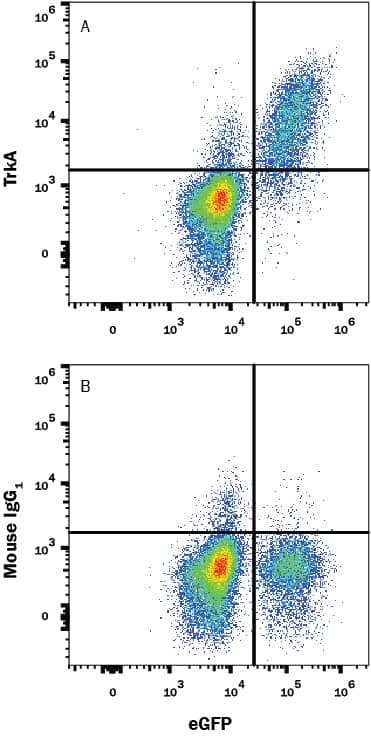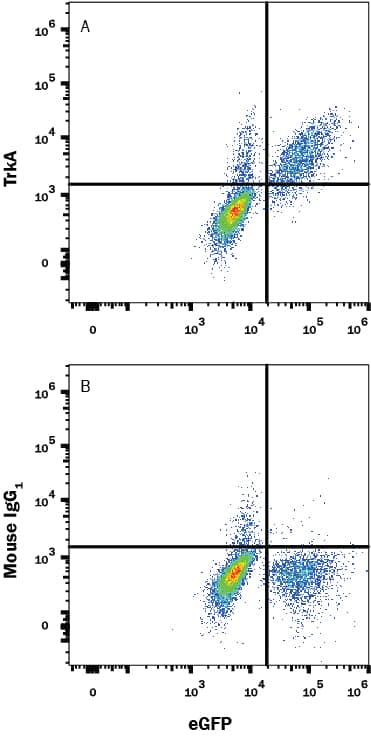TrkA: Antibodies
Bio-Techne offers high quality TrkA antibodies from our Novus Biologicals and R&D Systems brands. Our TrkA antibodies have been cited in 64 publications with 4 5-star customer reviews. Browse our catalog for anti-TrkA monoclonal, polyclonal, and recombinant monoclonal antibodies. These antibodies are reactive in target species including Human, Rat, Mouse, Hamster, Mesocricetus auratus (Hamster), and more. Our TrkA antibodies have been validated for use in several research applications: Knockout Validated, Immunohistochemistry, Flow Cytometry, Block/Neutralize, Immunocytochemistry/ Immunofluorescence, and more. Choose the anti-TrkA antibody best suited for your research needs by viewing the technical details, images, citations, reviews, and more. Each TrkA antibody is fully covered by Bio-Techne’s 100% guarantee.
Bio-Techne offers a comprehensive range of other TrkA-related products including TrkA Proteins and Enzymes, TrkA ELISA Kits, and more.
321 results for "TrkA Primary Antibodies" in Products
321 results for "TrkA Primary Antibodies" in Products
TrkA: Antibodies
Bio-Techne offers high quality TrkA antibodies from our Novus Biologicals and R&D Systems brands. Our TrkA antibodies have been cited in 64 publications with 4 5-star customer reviews. Browse our catalog for anti-TrkA monoclonal, polyclonal, and recombinant monoclonal antibodies. These antibodies are reactive in target species including Human, Rat, Mouse, Hamster, Mesocricetus auratus (Hamster), and more. Our TrkA antibodies have been validated for use in several research applications: Knockout Validated, Immunohistochemistry, Flow Cytometry, Block/Neutralize, Immunocytochemistry/ Immunofluorescence, and more. Choose the anti-TrkA antibody best suited for your research needs by viewing the technical details, images, citations, reviews, and more. Each TrkA antibody is fully covered by Bio-Techne’s 100% guarantee.
Bio-Techne offers a comprehensive range of other TrkA-related products including TrkA Proteins and Enzymes, TrkA ELISA Kits, and more.
| Reactivity: | Rat |
| Details: | Goat IgG Polyclonal |
| Applications: | WB, IHC |
| Reactivity: | Human |
| Details: | Goat IgG Polyclonal |
| Applications: | WB, Flow, IHC, CyTOF-ready, Neut |
Recombinant Monoclonal Antibody.
| Reactivity: | Human |
| Details: | Mouse IgG1 Monoclonal Clone #165131R |
| Applications: | Flow, CyTOF-ready, KO |
| Reactivity: | Human, Rat |
| Details: | Rabbit IgG Polyclonal |
| Applications: | WB |
Recombinant Monoclonal Antibody.
| Reactivity: | Human, Mouse, Rat |
| Details: | Rabbit IgG Monoclonal Clone #JJ084-04 |
| Applications: | IHC, WB, ICC/IF, Flow, IP |
| Reactivity: | Human |
| Details: | Goat IgG Polyclonal |
| Applications: | WB, Flow, IHC, CyTOF-ready, Neut |
| Reactivity: | Human |
| Details: | Mouse IgG1 Monoclonal Clone #994307 |
| Applications: | Flow, CyTOF-ready, ICC, Neut |
| Reactivity: | Human |
| Details: | Goat IgG Polyclonal |
| Applications: | WB, Flow, IHC, CyTOF-ready, Neut |
Recombinant Monoclonal Antibody
| Reactivity: | Human |
| Details: | Mouse IgG1 Monoclonal Clone #165131R |
| Applications: | Flow, KO |
Recombinant Monoclonal Antibody
| Reactivity: | Human |
| Details: | Mouse IgG1 Monoclonal Clone #165131R |
| Applications: | Flow, KO |
| Reactivity: | Rat |
| Details: | Mouse IgG2b Monoclonal Clone #315104 |
| Applications: | WB |
| Reactivity: | Human |
| Details: | Mouse IgG1 Monoclonal Clone #994307 |
| Applications: | Flow |
| Reactivity: | Human |
| Details: | Goat IgG Polyclonal |
| Applications: | WB, Flow, IHC, CyTOF-ready, Neut |
| Reactivity: | Human |
| Details: | Goat IgG Polyclonal |
| Applications: | WB, Flow, IHC, CyTOF-ready, Neut |
| Reactivity: | Human |
| Details: | Goat IgG Polyclonal |
| Applications: | WB, Flow, IHC, CyTOF-ready, Neut |
| Reactivity: | Human |
| Details: | Mouse IgG1 Monoclonal Clone #994307 |
| Applications: | Flow |
| Reactivity: | Human |
| Details: | Mouse IgG1 Monoclonal Clone #994307 |
| Applications: | Flow |
| Reactivity: | Rat |
| Details: | Goat IgG Polyclonal |
| Applications: | WB, IHC |
| Reactivity: | Rat |
| Details: | Goat IgG Polyclonal |
| Applications: | WB, IHC |
| Reactivity: | Human |
| Details: | Mouse IgG2a Monoclonal Clone #165126 |
| Applications: | WB |
| Reactivity: | Rat |
| Details: | Goat IgG Polyclonal |
| Applications: | WB, IHC |
| Reactivity: | Rat |
| Details: | Goat IgG Polyclonal |
| Applications: | WB, IHC |
| Reactivity: | Rat |
| Details: | Mouse IgG2b Monoclonal Clone #315104 |
| Applications: | WB |
| Reactivity: | Human |
| Details: | Goat IgG Polyclonal |
| Applications: | WB, Flow, IHC, CyTOF-ready, Neut |
| Reactivity: | Human |
| Details: | Goat IgG Polyclonal |
| Applications: | WB, Flow, IHC, CyTOF-ready, Neut |

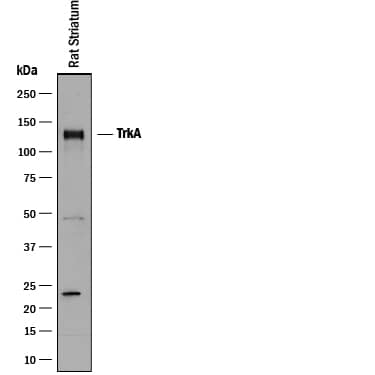
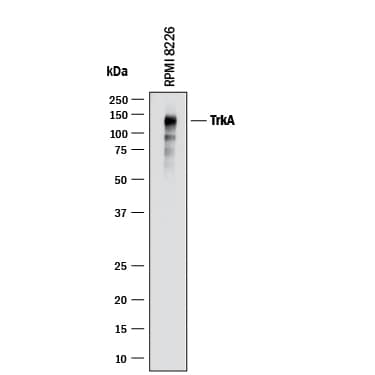
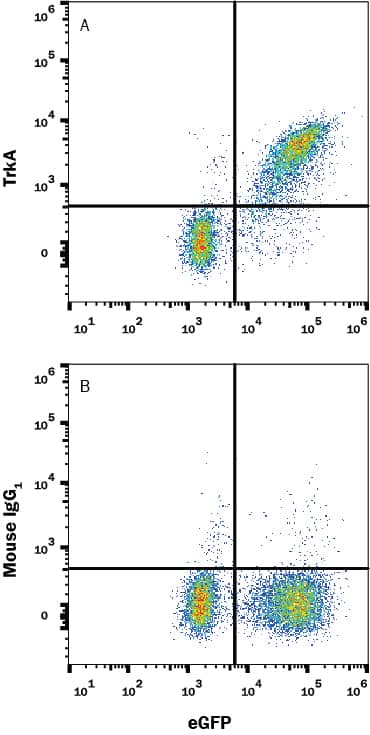


![Western Blot: TrkA Antibody (JJ084-04) [NBP2-67473] Western Blot: TrkA Antibody (JJ084-04) [NBP2-67473]](https://resources.bio-techne.com/images/products/TrkA-Antibody-JJ084-04-Western-Blot-NBP2-67473-img0010.jpg)
